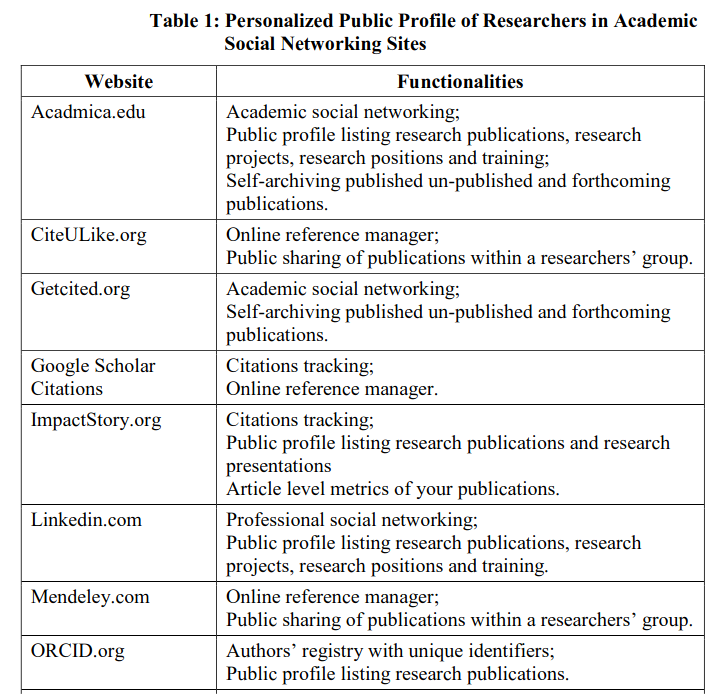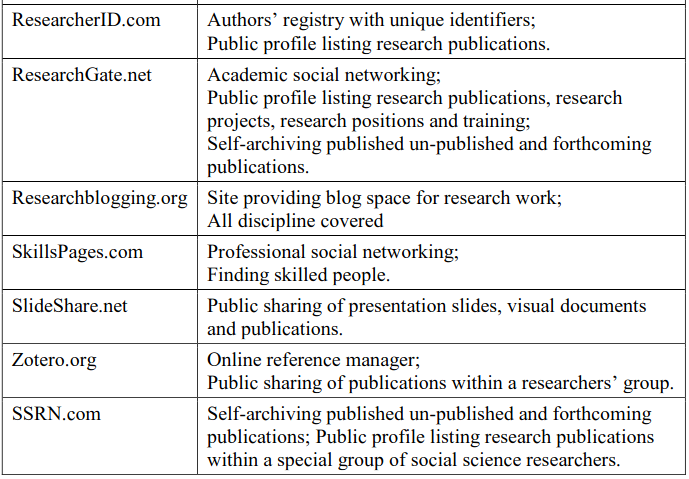1.3 USING SOCIAL MEDIA
Every discipline has its own network and/or professional bodies. So, it is obvious that you should target your professional network to share your work. Nevertheless, you should also share your work through generic research sharing social networks and other social networking websites. The San Francisco Declaration on Research Assessment (DORA), singed in 2012 by the scientific and researchers communities across the world, has given preference to the article level metrics (ALM) or altmetrics over traditional journal impact factor (JIF)-based assessment of career scientists. The concept of altmetrics explores the potentialities of social media and academic social networks, which helps in increasing global visibility, accessibility and readability of publications shared by the contributing authors. The researchers in the twenty first century are very keen to maintain online researchers’ profiles in academic social networking websites. They are also interested in transnational networking through online discussion forums, and peer-to-peer collaborative platforms. While a plenty of general purpose social networking sites are globally available, some online social networks are meant for academics and researchers. Academic social networking websites facilitate creation of online groups for discussion based on particular research interests. Table 1 provides an indicative list of social networking websites that facilitate networking of academics and researchers. All these social networking websites facilitate researchers in building their public profiles – listing their research publications, research projects, research positions or training. While ResearchGate.net, Academia.edu, Linkedin.com and few others facilitate user-to-user interactions and e-collaborations through e-groups; getCITED.org, SSRN.com and few others don’t have such web 2.0 features. Further details of some of these academic social networks are available in the following sub-sections.


Apart from considering joining any of the above platforms, for sharing your work and building your research profile, we suggest you to consider the following:
- YouTube10: Research today is not all about text alone. It is also about sharing your work and allowing others know how you did your work. Once your work is accepted and published, consider sharing a short video of your work. Ideally, you should plan about using video to promote your work, and for this you can use any simple digital camera to record some of your work in process/progress. Catching your work in action gives a sense of the difficulty/challenges in carrying out the work or demonstrates the methodology to the audience. YouTube has become a great place to share your work with others.
- Facebook11: You may like to use the world’s most used social networking site for sharing your video and information about your published work. While this helps to reach more people, if your work is already in open access, sharing the link there will help them to read your work.
- Twitter12: This is a micro-blogging site that allows you to update your status in 140 characters. It is one of the most popular ways to remain networked and share opinions about some aspect of our life, including scientific and scholarly achievements. You can share information about publication of your work, and also in a series of status post, you can share the finding. If you want to have discussion and all comments from other users to be gathered at one place, you may like to create a Hashtag (#).
- Blogging: There are many blogging sites that enable you to create your free blogs. You may also like to create a paid blog site for your research or your research team to share your work. Blogging is used in many ways by scholars and scientists. Research Blogging13 is space where users not only share abstracts their work, but also share news appeared in other sites. You can use blogging as an option to continuously write about your work, and thereby connect with the people who are working in the similar areas.
You will also note that use of social networking is becoming an important tool in measuring the impact of your work in recent times. For example a typical Almetric score include mention in news, twitter, blogs, google+, Facebook, etc.
